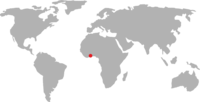INCREASING MOBILE BANKING USE AMONG RURAL POPULATIONS IN GHANA
OUR AIMS
Households benefit from access to formal savings. However, most households in developing countries do not have easy access to bank accounts. For example, in Ghana, the majority of banks are more than 30 minutes travel away from households. In contrast, mobile money services are widely used and readily accessible even in rural areas. However, while mobile money services have transformed the sending and receiving of funds, most users do not view mobile money accounts as a safe place to store money or to substitute for formal bank accounts (Financial Inclusion Insights (FII) survey 2015).
Integrating banking services into the mobile money platform, i.e. mobile banking, enables access to a bank account through the mobile money infrastructure. This dramatically decreases transaction costs services and provides the safety and security of a bank account alongside the ease of access of mobile money. Mobile banking services have the potential to increase savings significantly, improving household welfare and resilience to shocks. Understanding how mobile banking services can improve the income and resilience of rural households is an unexplored area, but, with the increasing spread of mobile money services, of considerable importance both academically and for policy makers.
The objectives of this research are to examine the best way to encourage usage of mobile banking services and to understand the mechanisms through which the decision to adopt mobile banking services operate.
ABOUT THE PROJECT
In Ghana, less than 40% of households live within 30 minutes of a bank branch (Financial Inclusion Insights survey 2015). In contrast, 90% of the population live with 30 minutes’ walk of a mobile money agent, needed to cash-in and cash-out of the account. Being able to cash-in and cash-out of a bank account using a widespread network of existing mobile money agents solves the last-mile problem of accessing bank accounts (the idea that banking services, in this case, are not directly present in people’s communities), particularly for those in rural areas who live far away from branches and ATMs. This would both save time and reduce transaction costs, making it cheaper and more convenient for households to access their bank accounts, and enabling increased use of banking products. Improved access to banking products can increase saving rates and enable better access to savings when they are most needed, improving welfare.
Researchers look at the impact of providing direct, cheap and easy bank account access through mobile money accounts (mobile banking) on rural households. The researchers examine different ways of providing information and training on knowledge, take-up, and usage of mobile banking, particularly seeking to find an effective way of enabling women to understand and take-up the mobile banking product.
The pilot study will involve a randomised design across 128 microfinance groups (512 clients) to test the effectiveness of three different forms of training. The details of the different training interventions are the following:
- Control group
Participants in this group will not receive any encouragement to use mobile banking. However, they continue to be free to use it. - Personal incentive
Participants in this group will receive a one-time small monetary incentive if they carry out a mobile banking transaction (deposit to a bank account or withdrawal from a bank account ) within a one-month period. They will also receive basic information and training on mobile banking from their credit officer. - Peer-led training and incentive + Personal incentive
For this group, the research team will implement a comprehensive training for the microfinance group leader in how to use mobile banking, as well as understand the benefits from using it. The group leader would then be asked to train the rest of her microfinance group members on mobile banking. The group leader (trainer) would also receive an incentive for each member (trainee) of her microfinance group who completed a mobile banking transaction (deposit to a bank account or withdrawal from a bank account). Each member of the microfinance group (including the leader) would also receive a monetary incentive if they carry out a mobile banking transaction themselves during a one-month period. - Peer-led training+ consumer protection training + peer incentive + personal incentive
For this group, the microfinance group leader will be trained to use mobile banking and also receive a training covering consumer protection and fraud awareness. The group leader would then be asked to train the rest of her microfinance group members on mobile banking and consumer protection. The group leader (trainer) would also receive an incentive for each member (trainee) of her microfinance group who completed a mobile banking transaction (deposit to a bank account or withdrawal from a bank account).
RESULTS
Research ongoing, results to follow.
PROJECT DETAILS
Timeline
July 2020 - September 2021
Location
Ghana

Theme
Firms, Farms and Labour
Associations

https://www.opportunity.org.uk/
https://opportunityghana.com/ver/




